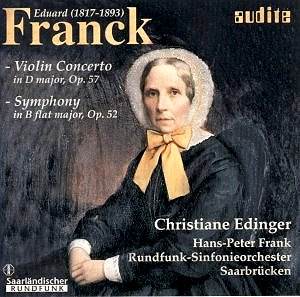In the first two of three movements of the Violin
Concerto Franck is clearly doffing his hat to the Olympian
heights of Beethoven's Violin Concerto and perhaps to the slow
movement of the Brahms. In the allegro finale the writing
is more flamboyant but aiming to delight rather in the dance floor
sense of the Op. 49 quartet’s finale. There is no hint of 'moving
the earth' with dramatic gesture. The compass is primed by the
Beethoven Romances and Violin Concerto.
The B flat major symphony confidently
inhabits the world of the Schumann Second Symphony and the Mendelssohn
Scotch. However along the way we have excursions into snowy
soliloquies (Tchaikovsky's Winter Daydreams came to mind).
Franck sometimes summons up impressively Brucknerian concentration
with horn ornamentation to match. The open-air manner of Lange-Müller
and of Schumann's First Symphony is well carried off.
It is pleasing that this estimable symphony survived
unlike the well received A Minor and G Minor symphonies from 1846
and 1852 respectively. Perhaps you know otherwise ... let me know.
Eduard Franck had two brothers one of whom was
also a composer. Richard Franck's cello sonatas can be heard on
two other Audite CDs (20021 and 20031) coupled, in each case,
with cello sonatas by Eduard.
If you like your Schumann and Mendelssohn this
CD is certainly for you. Performances are remarkably well despatched.
You will have little to complain of and Hans-Peter Frank makes
hay with the many invitations to joyous exuberance that Franck
has left throughout these scores.
Rob Barnett
